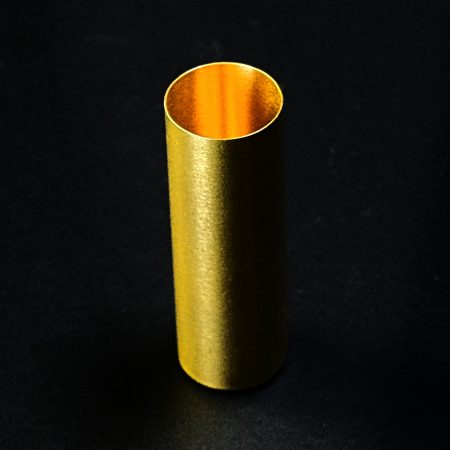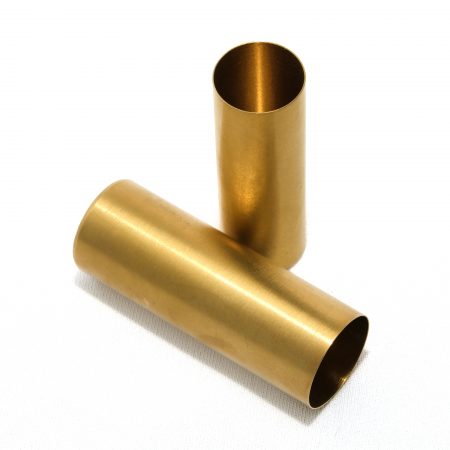
Maximizing manufacturing profits: the Swiss screw example – a process of determining best solutions
by Leister Blake Enterprises Ltd.

Sponsored by Leister Blake Enterprises Ltd.
Failure to keep suppliers informed of changing needs results in lost opportunities for increased profitability

Brass cups produced by Swiss Screw Machine to contain components of a wildlife transmitter device manufactured by Holohil Systems Ltd. PHOTO: Ron Friesen
It’s a good idea to schedule periodic “productivity maintenance” conversations with suppliers. All businesses benefit from sharing ideas and perspectives with stakeholders.
Perhaps one of the most overlooked means of cost-savings for manufacturers is in the area of supplier management. Your most cost-effective suppliers are those who require the lowest maintenance. Manufacturers benefit when they actively and openly communicate with qualified suppliers who listen, understand and have the resources to flex and respond accordingly.
The cost of custom components can be measured in terms of materials, labour and delivery. But many of the hidden costs of manufacturing will show up in missed deliveries, missed specifications resulting in re-run delays, and component imperfections which reflect on the quality perception of your final product performance. This of course leads to difficulties in marketing, sales and customer support…ie, the manufacturer’s reputation in the market. There is never a benefit to providing competitors with an advantage.
So, how do we make the most of our custom component suppliers? Here are some questions to consider when evaluating and selecting suppliers.
1. Does your company have and follow a documented supplier qualification process?
2. How much time and effort are put towards on-going supplier performance analysis? And does this analyze all of the costs associated with poor performance, along with all the benefits of working with a low maintenance supplier?
3. Does your company have a backup plan B in the event of a supplier misstep?
4. Does your purchasing process include one-on-one time with owners or executive managers of supply companies, giving you the opportunity to put forward ideas to improve their performance, reduce your cost of supplier maintenance and assure on-going expectations and requirements are met?
5. Does your supplier know enough about your business to understand what to look out for on your behalf as they go about their business? (Are they thinking about you always?) Enable, and expect your suppliers to act on your company’s behalf as eyes and ears, looking out for opportunities which may improve your profitability.
6. Will your supplier deliver your needs in terms of minimum quantities, warehousing / just-in-time deliveries, precision specifications and so on – as you would like?
7. Does your company consistently study your supply chain relationships and performance to insure they contribute to reducing your cost of sales while improving sales results?
Evaluating the swiss screw machining process as a logical path towards product quality, reliability, ease of sales and improved profitability.
It is a matter of precision, flexibility and unit cost.
While the part we are going to talk about here is quite simple, it exemplifies the importance of working with the right supplier who has the knowledge, experience and where-with-all to present a solution in context with what is the best possible outcome for the customer.

Brass cups produced by Swiss Screw Machine to contain components of a wildlife transmitter device manufactured by Holohil Systems Ltd. PHOTO: Ron Friesen
This part is a brass cup, designed to contain the power supply and transmitter components of a wildlife tracking device. By researching their exact need the manufacturer determined precision tolerances are critical to ensure the survivability of the product in the wild, where there is no tolerance for product failure.
Secondary to producing the ‘best solution’ in a particular market is the cost to produce. Considerations may include
Holohil Systems Ltd. believe quality control is the basis for the success of their company. The company worked with Rob Blake at Leister Blake Enterprises to investigate how the Swiss Screw machine might produce the best solution possible, all things considered (consistent specified tolerances, minimum order quantities, unit cost and dependable, efficient delivery from supplier warehousing, and so on). The resulting custom components are now incorporated into some of their highly successful products.
Result? Happy customer who, in turn has happy customers. It all adds up to profitability for another Canadian manufacturer.
Quite simply, the Swiss Screw Machine method features precision equipment following manual or CNC operation to turn, mill, drill, cut or otherwise produce a precision metal component to customer specification. In the case of the tracking enclosure discussed and shown above the raw material is brass. The swiss screw improves on close-tolerance consistency by having the cutting tool remain stationary while the stock turns. Ease of set-up means a prototype, or a variety of prototypes can be produced for evaluation quickly and with reasonable cost.
Leister Blake Enterprises is one of the most capable and experienced custom components suppliers to technology manufacturers. LBE provides the benefits of having direct and exclusive international relationships with pre-qualified custom components producers.
Whether it’s Swiss Screw, CNC, casting, plastic injection or other production method required Robert Blake and his team are always ready to hear from manufacturers looking to improve the quality and performance of their custom components supply. Call Robert and discuss ideas to save costs and improve profitability going forward.